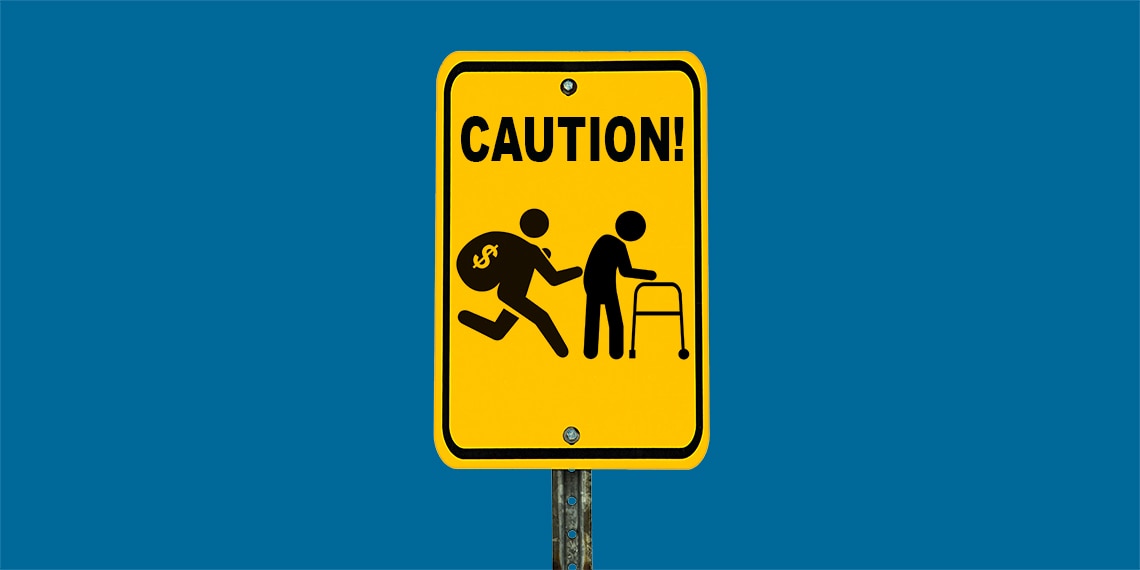
Each year nearly 5 million older Americans are victims of financial elder abuse, which is essentially an improper use of an adult’s funds, resources or property by another individual. The elderly are targeted by unscrupulous strangers, as well as family and friends who persuade, coerce, threaten them—or outright steal—in order to get their money or property.
The risk of these types of theft, scams and fraud is likely to increase as the U.S. population continues to age. By 2030, the largest segment of the population is projected to be over 65.
Here’s what can you can do to protect yourself and your loved ones from financial exploitation.
Common Types of Elder Financial Abuse
The elderly fall prey to numerous types of swindles, which currently cost them over $3 billion a year.
For example, the “Grandma” scam is a reality; a stranger calls up an older lady, pretending to be her grandchild who just happens to be desperately in need of thousands of dollars to be wired right away!
Scammers may also pose as financial institutions in order to access account information, or convince an older person of a fraudulent sweepstakes “win” to gather personal information or to glean personal data through misleading email or websites. These fraudsters can use the information to steal someone’s identity, and use it to take out loans, credit cards or access the victim’s financial accounts.
The sad truth is that many elder financial exploitation cases—nearly 70% in New York State, for example, according to the New York State Office of Children and Family Services (NYS OCFS)—are actually perpetrated by someone the older individual already knows, such as friends and family.
Such exploitation includes improper use of power of attorney or court-appointed guardianship; taking control of joint accounts; forging signatures to gain control of accounts or deeds; and the straightforward theft of vehicles, credit cards, benefit checks, cash or personal effects.
An older person may not know that anything is amiss, or may be afraid to come forward.
What Are the Warning Signs?
Warning signs of elder abuse take many forms, but any significant change in spending patterns should be an immediate cause for alarm. A glaringly out-of-place expenditure, such as an older person suddenly buying a new car or house, is an obvious red flag. Also take note of large withdrawals of cash that are similarly unexplained, excessively large gifts of cash or someone suddenly turning over power of attorney to an unexpected individual.
More subtle signs of abuse include unpaid bills, bounced checks, checks made out to “cash” and requests for new ATM cards. If an older person is suddenly confused about his or her finances, doesn’t understand transactions on his or her accounts, or looks afraid or vulnerable in the presence of someone who is involved in their finances, financial abuse may be occurring.
Why Are Older Americans Vulnerable?
Many factors make the elderly vulnerable, including declining mental ability, decreasing mobility, physical infirmities and even the onset of dementia. Older people may not be familiar with newer technologies and may be less wary of giving their personal information out over the phone or online, or be more trusting of those who pose as authority figures.
But what truly makes financial exploitation possible is silence. In order to maintain control, scammers persuade their victims not to talk about what’s going on: Financial exploitation thrives on silence and isolation.
Tips to Prevent Financial Exploitation
The first step to stopping elder financial abuse is to root out secret transactions and find the cause behind any odd behaviors.
- Look for Secrets. Be wary of anyone who tries to pressure an older person to keep a financial transaction secret. Remember the phone scammer who is trying to get Grandma to wire him money? He’ll probably tell her not to mention anything to “Mom” and “Dad” —with the cover story that they’ll be mad, of course. Don’t trust anyone who fosters dependency with phrases like “I’m the only one who can help you” or “the rest of the family is out to get you.”
- Avoid Isolation. Likewise, try to limit social isolation of the elderly. Maintain close ties with your older friends and family who may be vulnerable to elder financial abuse. For those living on their own, neighbors, people who provide in-home services or volunteers who deliver Meals on Wheels can serve as an extra set of eyes. Some financial institutions may even be trained to spot financial exploitation and to intervene if they suspect it.
- Take Control If Need Be. If an older person needs help managing bills and everyday finances, consider convenience accounts instead of joint accounts, the NYS OCFS recommends. With a convenience, or agent account, the helping individual has no legal right to the money in the account. And make sure your older loved ones know the basics of keeping personal data secure: shredding physical documents, never sharing personal information by phone or email, and in general, never sharing data unless you initiate the conversation with a financial institution.
- Speak Up. If you do suspect a problem, don’t keep it to yourself. Speak up to a trusted individual who has no sway over the money, and speak to your loved one, away from the influence of the suspected perpetrator. And, of course, if you suspect any type of abuse of a vulnerable adult, contact your state’s adult protective services or reach out to a law office to report a crime.
Julie Anne Russell is a Brooklyn-based freelance journalist. She writes on personal finance, small business, travel and more.
Read about the Conversation with Your Aging Parents You Can’t Afford to Skip.

